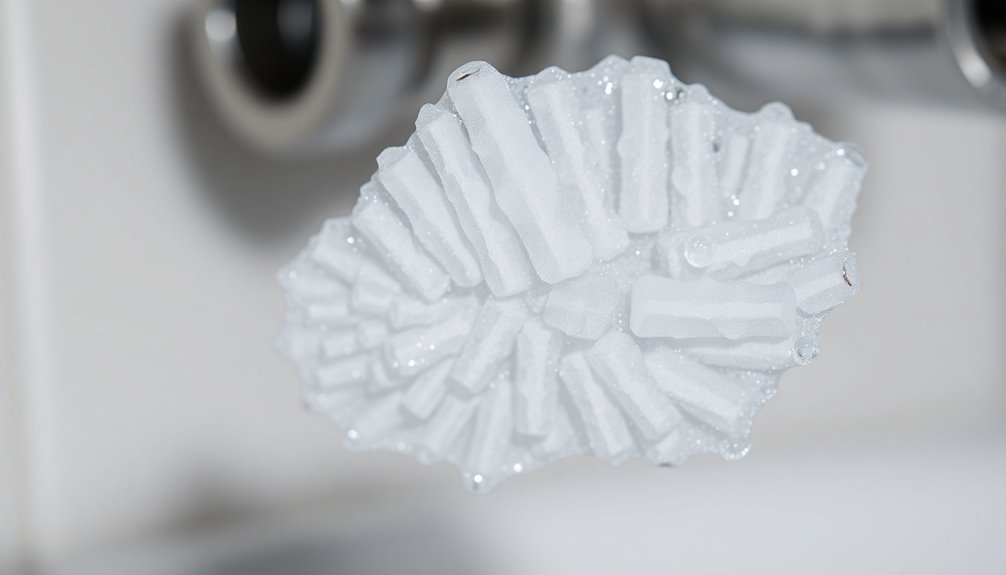Water scale is the buildup of mineral deposits, mainly calcium carbonate and magnesium silicate, caused by hard water. When hard water is heated or evaporates, these minerals precipitate and form scale. This accumulation reduces water flow, clogs pipes, and lowers the efficiency of appliances like heaters and dishwashers, leading to increased energy costs. Recognizing symptoms of scale can help you take action. Keep exploring to discover effective solutions for managing water scale in your home.
Key Takeaways
- Water scale is a buildup of mineral deposits, mainly calcium carbonate and magnesium silicate, from hard water evaporation or heating.
- It forms when heating hard water decreases mineral solubility, leading to precipitation and crystallization of minerals.
- Scale can accumulate in pipes and appliances, reducing efficiency and increasing energy costs by up to 30%.
- Symptoms of scale buildup include chalky deposits, stiff laundry, cloudy dishes, and increased soap usage for effective cleaning.
- Regular water quality testing helps identify hardness levels and guides treatment solutions to prevent scale formation and protect home systems.
What Is Water Scale?
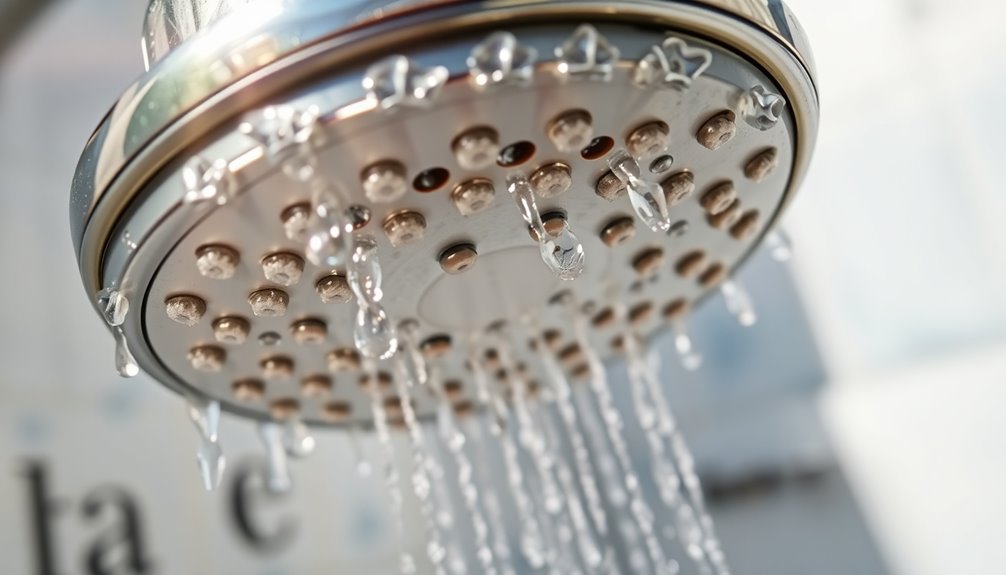
Water scale is that pesky buildup of mineral deposits you often see around your faucets and showerheads. It primarily consists of calcium carbonate and magnesium silicate, forming when hard water evaporates or is heated.
This white, chalky substance indicates the accumulation of dissolved minerals like calcium and magnesium, which contribute to water hardness. When scale forms, it can greatly impact your plumbing and appliances. You might notice reduced water flow or even appliance deterioration over time.
If left unchecked, the insulating effect of scale can decrease heat transfer efficiency in heating systems, leading to higher energy consumption. Managing water scale is crucial to prevent costly maintenance and guarantee your fixtures and appliances function efficiently. Additionally, just as with wood-burning stoves, using well-seasoned wood can enhance efficiency and reduce buildup in heating systems.
Causes of Water Scale Formation
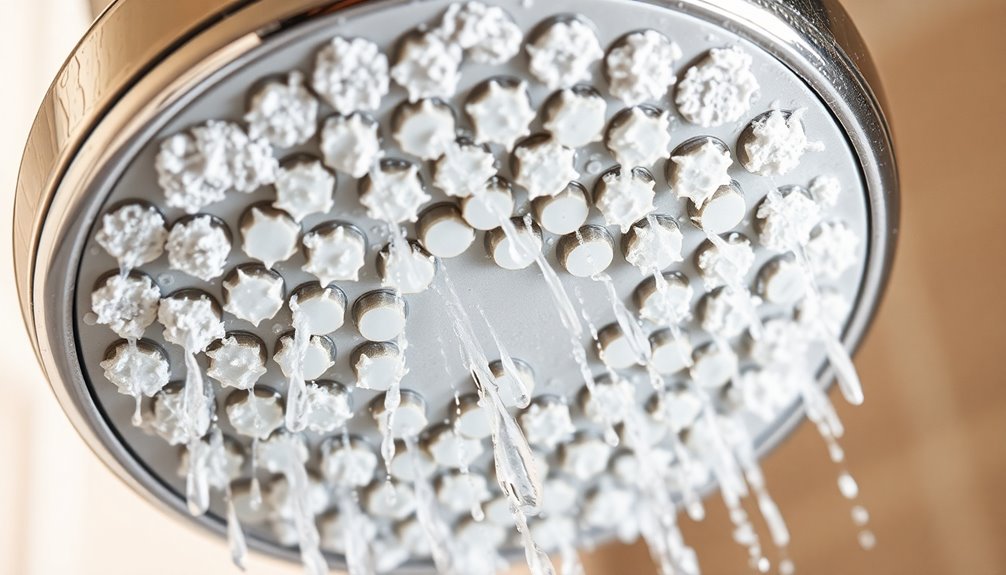
Water scale forms mainly due to the minerals in your water, like calcium and magnesium.
When you heat hard water, these minerals become less soluble, leading to scale buildup.
Plus, evaporation concentrates these minerals, making it easier for them to crystallize and create deposits. Additionally, air quality can be affected by the presence of water scale, as it may contribute to the release of impurities into the air when heated.
Mineral Composition of Water
The mineral composition of your water plays an essential role in the formation of scale. Hard water contains high levels of dissolved minerals, primarily calcium and magnesium, which can precipitate as scale when conditions change. As water flows through rocks and soil, it picks up these minerals, leading to increased concentrations that contribute to scale buildup.
| Mineral | Impact on Scale Formation |
|---|---|
| Calcium | Precipitates as calcium carbonate when heated |
| Magnesium | Contributes to overall hardness, increasing scale |
| Alkalinity | Higher levels can enhance scale formation |
| pH Levels | Elevated pH often leads to more deposits |
| Hardness | Defined by calcium and magnesium concentration |
Understanding these factors can help you manage scale issues in your home. Regular maintenance of your pool's best pool vacuum systems can also aid in minimizing scale buildup by keeping surfaces clean and free of debris.
Temperature and Pressure Effects
As temperatures rise, the solubility of calcium carbonate decreases, causing it to precipitate and form scale.
In high-pressure environments, like cooling towers, this effect intensifies. Increased pressure can lower the solubility of certain minerals, accelerating scale deposition as water evaporates.
You'll often find that the hottest surfaces, such as boiler tubes, are the first to accumulate scale due to the retrograde solubility of calcium carbonate.
When water cools or evaporates under elevated pressure, the concentration of dissolved minerals can spike, further promoting scale formation.
Consequently, it's essential to monitor both temperature and pressure in your water systems to effectively manage the risk of scale build-up and maintain peak performance. Additionally, understanding heat pump efficiency can aid in designing systems that minimize scale formation by optimizing temperature and pressure conditions.
Evaporation and Concentration Factors
In high-temperature environments, evaporation plays a significant role in scale formation. When water heats up, it loses moisture, leaving behind dissolved minerals like calcium and magnesium.
As evaporation continues, you'll notice an increase in the concentration of these minerals, leading to supersaturation and eventual precipitation of scale deposits. The higher temperatures reduce the solubility of calcium carbonate, encouraging its crystallization on surfaces.
In systems such as boilers and cooling towers, continuous evaporation can cause significant scale buildup, which ultimately impacts efficiency and heat transfer.
Additionally, the presence of contaminants and high alkalinity levels can further intensify the concentration of these scale-forming minerals, making it essential to manage evaporation effectively to prevent costly maintenance issues. Proper heat pump maintenance can also help mitigate the effects of scale buildup on system performance.
The Impact of Water Scale on Home Systems
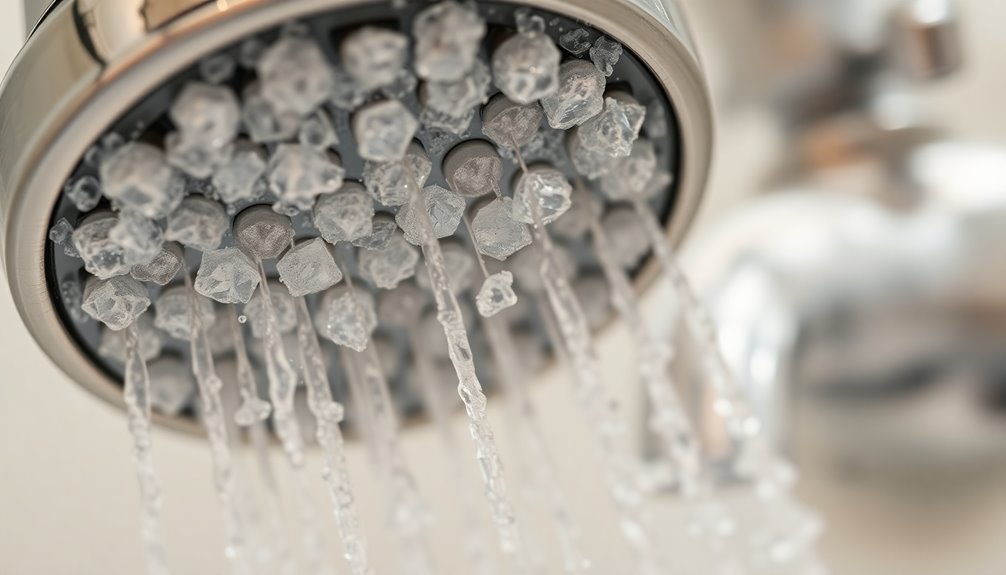
While you mightn't notice it at first, water scale can wreak havoc on your home systems. Scale deposits can build up in your pipes, drastically reducing flow rates and potentially causing complete blockages that require costly replacements.
Your appliances, like water heaters and dishwashers, may also suffer decreased efficiency and increased energy consumption due to these deposits on heating elements. You'll find unsightly chalky residues on your dishes and glassware, leading to extra cleaning efforts.
Plus, hard water scale can leave your laundry stiff and dingy, as it hampers soap lathering, making you use more detergent. Investing in effective water treatment systems can help mitigate these issues, saving you time and money in the long run. Additionally, regular maintenance of heat pump systems can enhance their efficiency and minimize the impact of scale on performance.
Symptoms of Hard Water and Scale Buildup
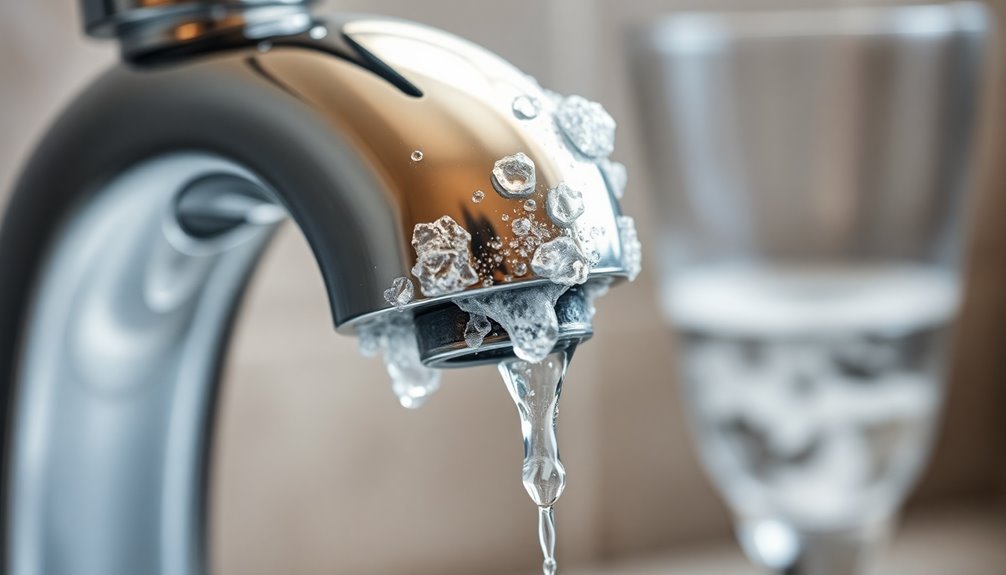
You might notice scale accumulation on your faucets or showerheads, which can be frustrating.
If your laundry feels stiff or your dishes have a cloudy residue, it's a sign of hard water affecting your home.
Plus, these issues can lead to increased energy costs as appliances struggle to operate efficiently. Regular maintenance of appliances can help mitigate the effects of hard water scaling.
Visible Scale Accumulation
Visible scale accumulation manifests as unsightly white, chalky deposits on faucets, showerheads, and sinks, signaling the presence of hard water minerals like calcium and magnesium. You might notice these deposits building up in your home, which can be frustrating. Here's how to recognize the symptoms of hard water and scale buildup:
| Symptoms | Description |
|---|---|
| White Deposits | Chalky residues on fixtures and surfaces |
| Increased Soap Use | More soap needed for lathering |
| Dingy Laundry | Clothes appear stiff and unclean |
| Cloudy Dishes | Glassware looks dirty despite washing |
| Higher Energy Costs | Appliances work less efficiently |
Addressing these issues not only improves cleanliness but can also save you money in the long run. Additionally, the presence of hard water can also affect the efficiency of appliances, similar to how regular filter replacement is necessary for maintaining air purifier performance.
Laundry and Dish Effects
When hard water flows through your laundry and dishwashing cycles, it can leave you with frustrating results. The minerals in hard water inhibit soap from lathering effectively, leading to stiff and dingy laundry that feels rough against your skin.
Plus, you might notice a cloudy appearance on your dishes and glassware due to scale buildup, requiring extra scrubbing to restore their shine. You'll find yourself using more detergent, trying to combat the effects of the hardness scale, which can also increase your household expenses.
Additionally, scale can coat your washing machine, affecting its cleaning ability and potentially causing premature wear on fabrics. This means your clothes and dishes won't look or feel their best, making chores even more tedious. Regular maintenance of your air purifier filters can help improve air quality, especially in homes with hard water issues.
Increased Energy Costs
As hard water flows through your home, it can quietly escalate your energy costs due to scale buildup on heating elements and within pipes.
This accumulation decreases the efficiency of your water heater, forcing it to work harder to maintain desired temperatures. Additionally, when pipes become clogged with scale, flow rates drop, and your heating systems consume even more energy to function properly.
You might also find yourself spending more on maintenance and repairs because of these issues. Plus, hard water can lead to increased soap usage in dishwashers and laundry machines, driving up your cleaning expenses.
Studies indicate that significant scale buildup can boost energy costs by up to 30%, making it essential to address this problem promptly. Understanding energy efficiency in your home can help mitigate these costs and improve overall performance.
How Scale Affects Appliances and Plumbing
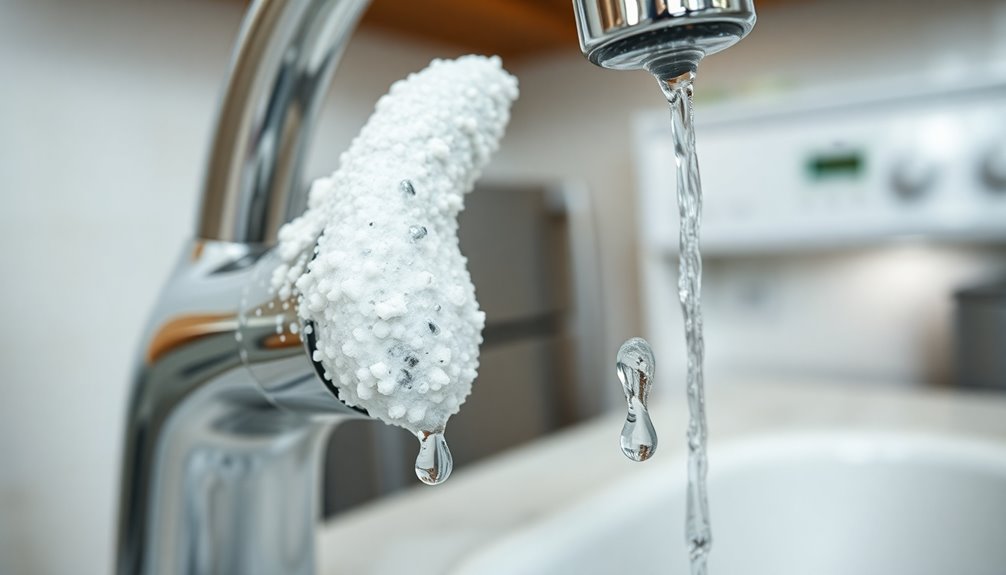
Scale buildup can quietly wreak havoc on your appliances and plumbing, often leading to costly repairs or replacements.
Over time, you may notice several issues arising from scale:
- Increased energy consumption in water heaters as they struggle to heat water efficiently.
- Chalky residues on dishes from dishwashers, reducing cleaning effectiveness.
- Stiff and dingy laundry in washing machines due to poor soap lathering.
- Restricted water flow in faucets and showerheads, affecting shower experiences.
- Shortened lifespan of appliances and plumbing, resulting in expensive replacements.
Implementing a water treatment program can help mitigate these problems, keeping your appliances running smoothly and prolonging their life.
Don't ignore scale—it can be a silent but costly issue in your home.
Solutions for Eliminating Water Scale
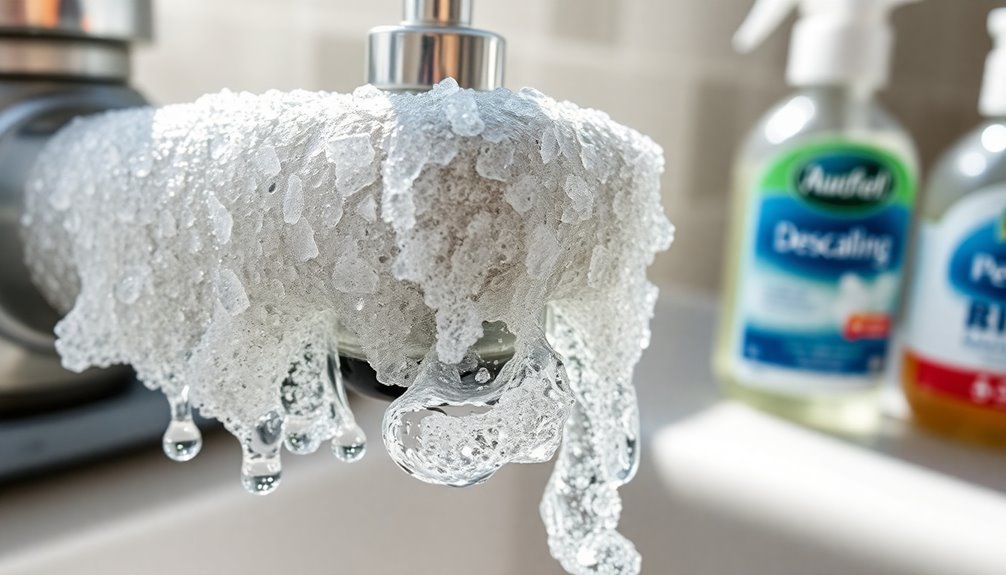
If you're dealing with water scale, there are effective solutions you can implement.
Water softening systems, chemical treatments, and regular maintenance practices can all help tackle the issue.
Understanding which options work best for your situation will make a significant difference in preventing scale buildup.
Water Softening Systems
Water softening systems provide an effective solution for tackling the issues caused by hard water, which can lead to costly scale buildup in your plumbing and appliances.
By utilizing ion exchange technology, these systems replace calcium and magnesium ions with sodium ions, greatly reducing water hardness.
Consider these key benefits of water softening systems:
- Comprehensive Coverage: Install a point-of-entry (POE) system for whole-home protection.
- Maintenance Matters: Regular upkeep guarantees peak performance and prevents scale.
- Salt-Free Options: Specialty systems use template-assisted crystallization without adding sodium.
- Tailored Solutions: Free in-home water tests help determine the best system for your needs.
- Long-Term Savings: Reducing scale can extend the life of your appliances.
These solutions effectively address hard water issues and enhance your home's plumbing health.
Chemical Treatments
While hard water can lead to considerable issues in your plumbing, chemical treatments offer effective solutions for eliminating water scale.
These treatments often use threshold inhibitors to increase the solubility of scale-forming minerals, preventing them from depositing on surfaces.
Crystal growth modifiers change how scale crystals form, making them less adherent and easier to remove.
Additionally, solutions like citric acid act as sacrificial media, binding with hardness ions to discourage scale formation.
By regularly applying these chemical treatments, you can considerably reduce maintenance costs and improve the efficiency of your water systems by preventing scale buildup.
Just remember to tailor your chemical treatment options to your specific water composition for the best results.
Regular Maintenance Practices
Chemical treatments can greatly reduce water scale, but regular maintenance practices are equally important for keeping your plumbing systems in prime condition.
By adopting these habits, you can improve water quality and minimize maintenance costs:
- Regularly inspect and clean fixtures and appliances to eliminate visible scale buildup.
- Use vinegar or commercial descaling solutions on showerheads and faucets to maintain ideal water flow.
- Install a point-of-entry (POE) water treatment system, like a water softener, to reduce hardness minerals.
- Schedule annual water quality tests to monitor hardness levels and adjust your maintenance practices.
- Conduct routine checks on water-using appliances to catch scale issues early, preventing costly repairs.
These practices can enhance efficiency and prolong the lifespan of your plumbing fixtures.
The Role of Water Softeners in Scale Prevention
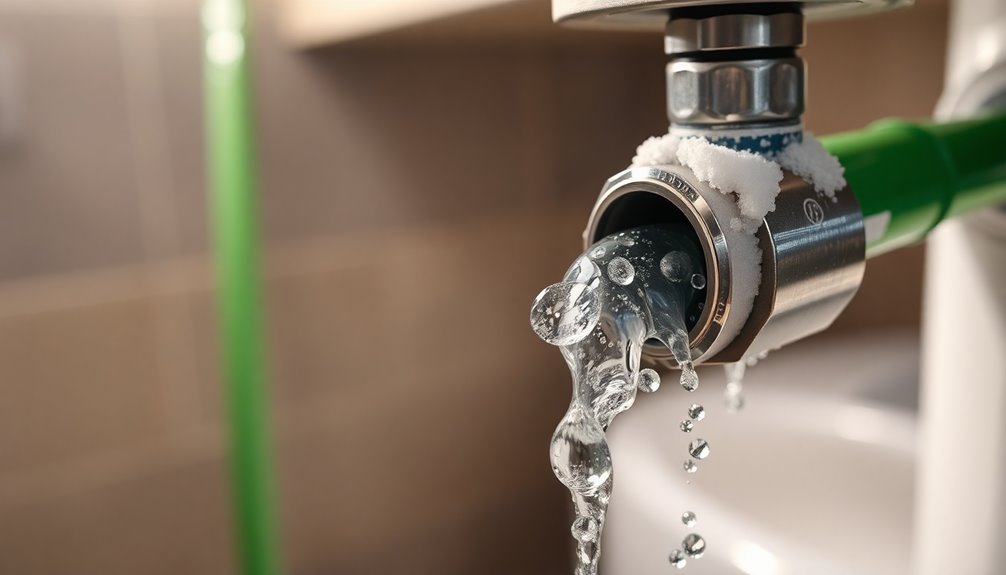
If you've ever noticed unsightly scale buildup on your appliances or fixtures, a water softener could be the solution you need. Water softeners utilize ion exchange technology, replacing hardness minerals like calcium and magnesium with sodium ions. This process minimizes scale formation throughout your home, improving appliance efficiency and extending their lifespan.
Here's a quick comparison of benefits:
| Benefits | With Water Softeners | Without Water Softeners |
|---|---|---|
| Scale Buildup | Reduced | Increased |
| Energy Efficiency | Improved | Decreased |
| Maintenance Costs | Lower | Higher |
Regular use of water softeners not only enhances water quality but also leads to cleaner laundry and dishes, eliminating the residue caused by hard water.
Importance of Regular Water Quality Testing
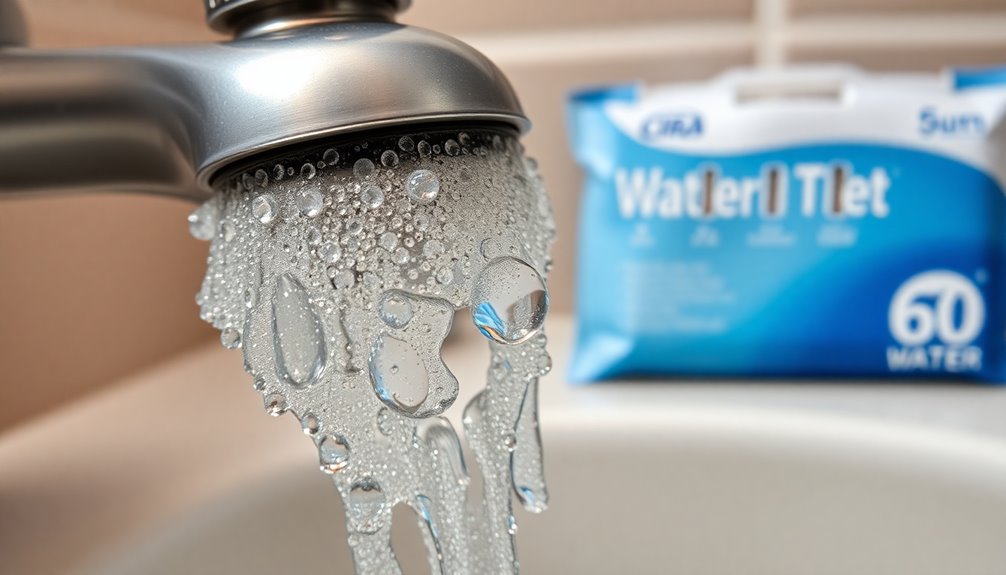
Understanding the importance of regular water quality testing is essential for maintaining a healthy home environment. By routinely testing your water systems, you can catch potential scaling issues before they escalate. Scale can severely impact your plumbing and appliances, leading to costly repairs.
Regular water quality testing is crucial for preventing scaling issues that can damage plumbing and appliances, avoiding costly repairs.
Here are some key reasons to prioritize water quality testing:
- Identifies levels of hardness, including calcium and magnesium
- Reveals pH, alkalinity, and dissolved solids that contribute to scale
- Guides appropriate treatment methods for scale management
- Proactively prevents scale buildup in appliances
- Guarantees superior performance of your water treatment systems
The Water Quality Association recommends testing at least once a year to stay ahead of scaling problems and protect your home.
Understanding Different Types of Scale in Water Treatment
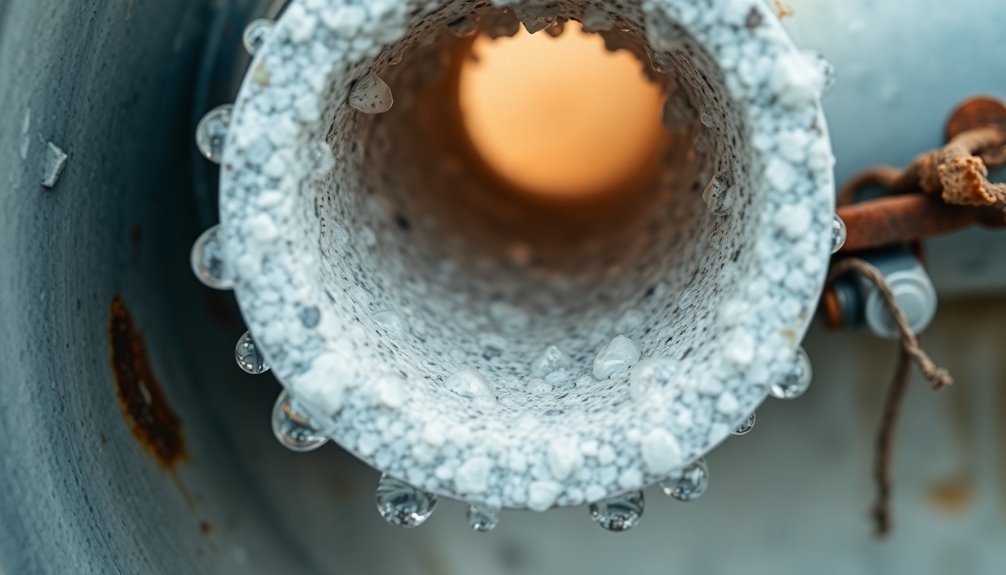
Water treatment systems face various challenges from different types of scale, which can greatly impact their efficiency and longevity.
The most common is calcium carbonate scale, forming from minerals like calcium and carbonate ions, especially in cooling systems and boilers where elevated temperatures promote precipitation.
Calcium sulfate scale presents issues in high-salinity environments like desalination plants due to its low solubility.
Barium sulfate scale can obstruct pipes in oilfield operations, increasing maintenance costs.
Similarly, strontium sulfate scale clogs filters and membranes, hindering desalination efficiency.
Finally, halite scale, composed of sodium chloride, forms in high-salinity water sources, leading to corrosion and reduced thermal efficiency.
Understanding these scales helps you manage challenges effectively in your water treatment processes.
Best Practices for Scale Management in Home Systems
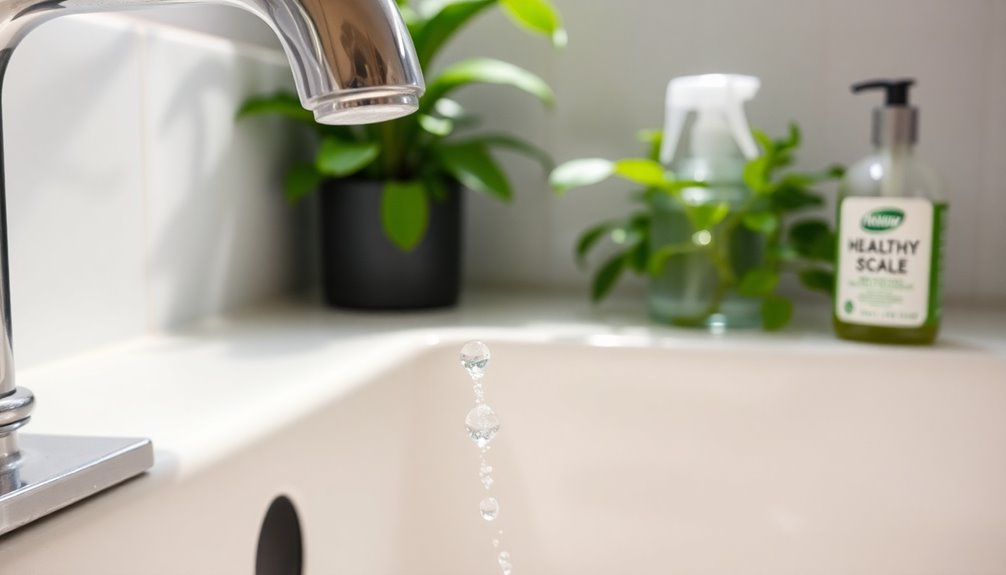
While scale buildup can lead to costly repairs and inefficient appliances, implementing best practices for scale management in your home can make a significant difference.
Here are some effective strategies to evaluate:
- Regularly descale water-using appliances every few months.
- Install a point-of-entry (POE) water treatment system, like a water softener.
- Monitor water quality parameters, including calcium, magnesium, and pH levels.
- Use vinegar or citric acid solutions for routine cleaning of fixtures and appliances.
- Schedule periodic in-home water tests to identify specific treatment needs.
Frequently Asked Questions
How Does Scale Form in Water?
Scale forms in water when dissolved minerals like calcium and magnesium precipitate as the water evaporates or heats up.
As temperatures rise, the solubility of calcium carbonate decreases, leading to solid deposits.
If your water's alkalinity and pH levels are high, it increases the chances of scale forming.
You might notice this buildup in your appliances or plumbing, especially if you regularly use hard water, requiring ongoing monitoring to prevent damage.
What Does a Water Hardness of 7 Mean?
A water hardness of 7 means you're dealing with moderately hard water, which can impact your daily life.
You might notice you're using more soap, struggling with lathering, and finding residue on your dishes and laundry.
Additionally, this level of hardness can lead to mineral deposits in your appliances, reducing their efficiency and lifespan.
To keep your water and appliances in good shape, consider testing your water regularly and possibly using water softeners.
How to Get Rid of Water Scaling?
To get rid of water scaling, start by installing a water softener to reduce hard minerals.
Regularly clean surfaces with descaling solutions to eliminate existing deposits.
Consider using water treatment technologies like sacrificial media or threshold inhibitors to prevent future scale formation.
Perform routine water quality tests to identify hardness levels and choose the right treatment.
Engaging water treatment professionals can help you find tailored solutions for your specific needs.
What Causes Scale Water?
Scale water is caused by minerals like calcium and magnesium dissolving in water.
When that water evaporates, it leaves those minerals behind, creating scale on surfaces.
You'll notice this more in heated areas, where evaporation is intense.
If your water has high levels of calcium, magnesium, and alkalinity, you're more likely to encounter scale.
Regular maintenance and using water softeners can help prevent scale buildup in your plumbing and appliances.
Conclusion
In the journey of home maintenance, understanding water scale is like steering through a winding river—full of twists and turns, but essential for smooth sailing. By recognizing its causes and effects, you're equipped to steer clear of costly damage. With the right tools, like water softeners and regular testing, you can keep your water systems flowing freely. Embrace these practices, and watch your home thrive, unencumbered by the hidden burdens of scale. Your peace of mind is worth it!

